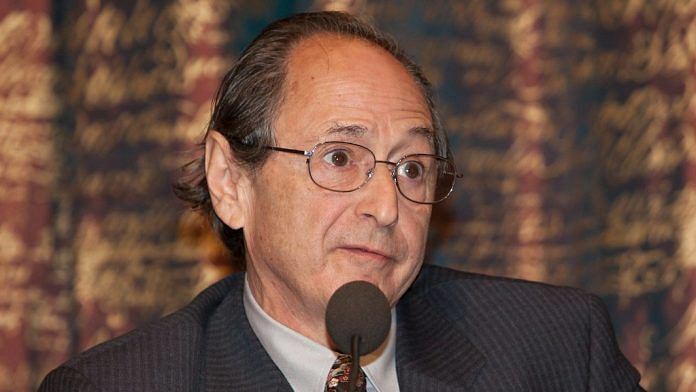New Delhi: The recovery from COVID-19, which has affected more than 190 countries and infected over 3.86 lakh people, will be a lot faster than anticipated, according to Nobel laureate Michael Levitt, a biophysicist at Stanford University.
Speaking to an Israeli daily, Calcalist, Levitt said, “…the end of the pandemic is near.”
Other epidemiologists have been warning that the effects of COVID-19 will likely continue for a long time and result in more deaths and massive social disruption. However, Levitt asserts that the data does not support such a dire scenario, especially if measures such as self-isolation and social distancing are practised.
“What we need is to control the panic… we’re going to be fine,” he said.
Levitt won the 2013 Nobel Prize in Chemistry for the development of multi-scale models for complex chemical systems.
Also read: At current rate, India can see 30,000 COVID-19 deaths by May, no hospital bed by June: Data
Early predictions
Levitt began studying the data on novel coronavirus cases in January and predicted that China would be done with its worst phase of the pandemic by February, a lot sooner than many health experts had anticipated. In his interview to Calcalistech, Levitt said he noticed that while the number of deaths had increased, the rate of increase had slowed down.
Also read: As China’s virus cases reach zero, experts warn of second wave
Similar trends across countries
In his analysis of the novel coronavirus, Levitt studied data from 78 countries that reported more than 50 new cases of the disease daily, and found many “signs of recovery” in them.
“Numbers are still noisy, but there are clear signs of slowed growth,” Levitt said.
He advocated social distancing and believed that it was a crucial measure to fight the virus. He also underscored the need for a complete ban on large gatherings as the virus is so new that people still lacked immunity to it.
“This is not the time to go out drinking with your buddies,” Levitt said.
He also blamed the media for causing unnecessary panic by focusing on the increase in the cumulative number of cases and highlighting the cases of celebrities who contracted the virus.
On dealing with the virus, Levitt said it was important to get vaccinated against the flu. He argued that a coronavirus outbreak in the middle of a flu epidemic would overwhelm hospitals and could potentially increase the number of COVID-19 cases that go undetected.
Also read: How to slow down COVID-19 — this is the only way to ‘flatten the curve’ of coronavirus spread




Our top-notch journalists always try to attract people’s attention by adopting even the most inept means which are worth being discarded straightaway.Common people in India are more excited about listening to rumours than that of paying attention to factual analysis that’s why we are languishing at the bottom of the table in terms of spreading awareness among our public.
Problem in India is that journalists pretend to be everything. They are physicists, biologists and economists… If they can’t pretend to be one then they will bring a person who has barely done anything good in his/her life and this person will give his/her “expert” opinion which will be final. Seeking information from Nobel laureate like Levitt is a luxury that Indian journalists do not want to exercise as it will hinder their agenda.